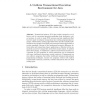Free Online Productivity Tools
i2Speak
i2Symbol
i2OCR
iTex2Img
iWeb2Print
iWeb2Shot
i2Type
iPdf2Split
iPdf2Merge
i2Bopomofo
i2Arabic
i2Style
i2Image
i2PDF
iLatex2Rtf
Sci2ools
108
click to vote
ECOOP
2008
Springer
2008
Springer
A Uniform Transactional Execution Environment for Java
Abstract. Transactional memory (TM) has recently emerged as an effective tool for extracting fine-grain parallelism from declarative critical sections. In order to make STM systems practical, significant effort has been made to integrate transactions into existing programming languages. Unfortunately, existing approaches fail to provide a simple implen that permits lock-based and transaction-based abstractions to coexist seamlessly. Because of the fundamental semantic differences between locks and transactions, legacy applications or libraries written using locks can not be transparently used within atomic regions. To address these shortcomings, we implement a uniform transactional execution environment for Java programs in which transactions can be integrated with more traditional concurrency control constructs. Programmers can run arbitrary programs that utilize traditional mutual-exclusion-based programming techniques, execute new programs written with explicit ional constructs, and...
Declarative Critical Sections | ECOOP 2008 | Fundamental Semantic Differences | Programming Languages | Uniform Transactional Execution |
Related Content
| Added | 19 Oct 2010 |
| Updated | 19 Oct 2010 |
| Type | Conference |
| Year | 2008 |
| Where | ECOOP |
| Authors | Lukasz Ziarek, Adam Welc, Ali-Reza Adl-Tabatabai, Vijay Menon, Tatiana Shpeisman, Suresh Jagannathan |
Comments (0)

